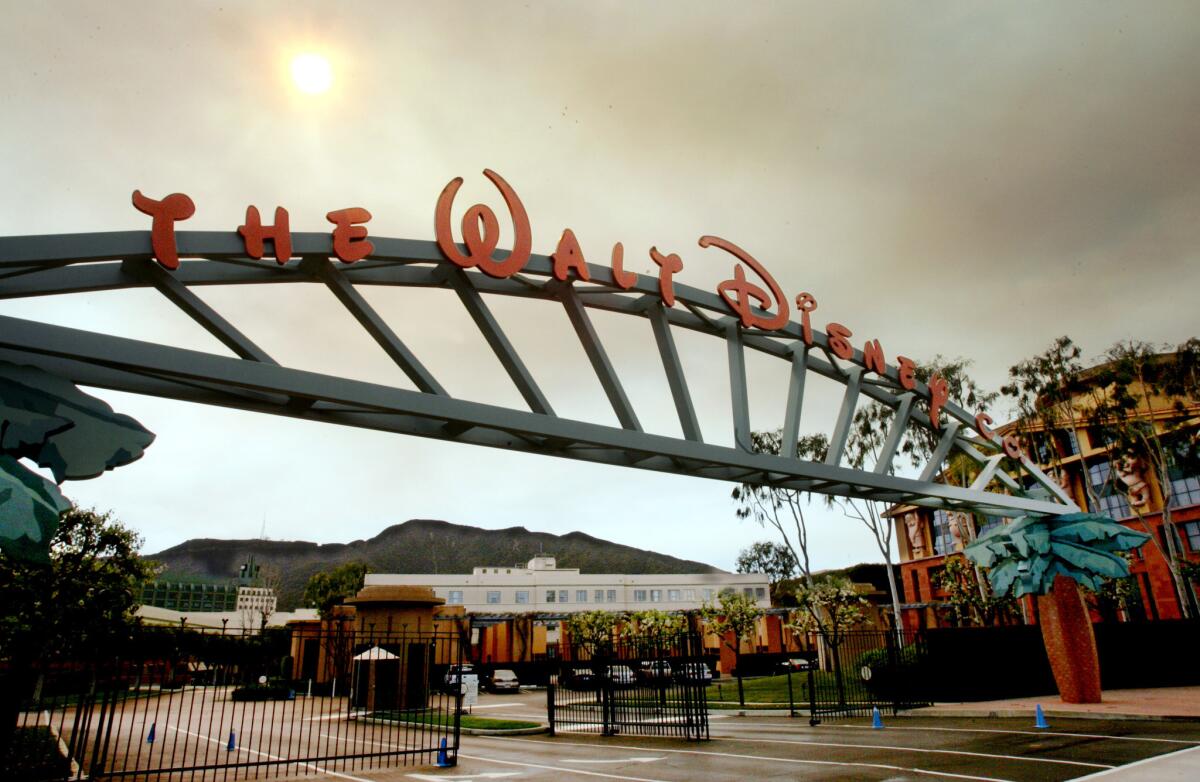Disney, reeling from the coronavirus, raises $6 billion in debt offering

- Share via
Buffeted by the coronavirus outbreak, the Walt Disney Co. on Friday said it had raised nearly $6 billion in a debt offering.
The debt offering comes one week after Disney closed its domestic theme parks, suspended cruise ship sailings and pulled a high-profile movie release. The company is shoring up its debt structure amid the cascading effect of the global pandemic, including heightened fears of a recession that could slow the Burbank entertainment giant’s recovery.
Disney, in its regulatory filings, said it planned to use proceeds from the sale for “general corporate purposes,” including restructuring existing debt, making acquisitions, buying back shares or investing in its various business units. But the company cautioned investors about the economic damage from the coronavirus.
“The outbreak of the novel coronavirus ... and measures to prevent its spread are affecting our business in a number of ways, which should be considered in connection with an investment in the notes,” Disney said Friday in a Securities and Exchange Commission filing. “We have closed our theme parks; suspended our cruises and theatrical shows; delayed theatrical distribution of films both domestically and internationally; and experienced supply chain disruption and ad sales impacts.”
The latest updates from our reporters in California and around the world
Disney raised the money — $5.98 billion — Thursday through the sale of five sets of notes that will expire between 2025 and 2050, according to the filing. Interest rates on the notes range from 3.35% to 4.7%. The issuance is expected to be finalized Monday.
The debt offering comes just one year after Disney completed the $71-billion purchase of much of Rupert Murdoch’s 21st Century Fox. Disney Executive Chairman Bob Iger viewed the Fox takeover as a way to fortify his company for the streaming age, and the purchase greatly expanded Disney’s profile and its pipeline of movies and TV shows. Disney now owns the majority stake in streaming service Hulu, and the company has plans to sell that service directly to consumers along with its recently launched Disney+ streaming service and ESPN+.
But the blockbuster Fox deal more than doubled Disney’s debt, to nearly $48 billion.
In the wake of the global pandemic, ratings agencies have reassessed Disney’s credit rating. On Wednesday, Fitch Ratings downgraded Disney’s credit outlook to “negative” from “stable.”
The economic effect of the coronavirus has been devastating to the company. Disney’s theme parks are closed around the world, and its cruise ships are stuck in harbors.
Movie theater closures have erased another big source of revenue for the company because Walt Disney Studios relies heavily on its box office blockbusters. Disney had been banking on the release of the live action “Mulan” in late March, but now that won’t happen. Meanwhile, its longtime profit engine, ESPN, has been struggling to cobble together a compelling lineup after the mass cancellations of live sports. Analysts say ESPN could lose 80% of its advertising revenue.
Disney, in its filing, acknowledged that “there has been a disruption in creation and availability of content we rely on for our various distribution paths, including most significantly the cancellation of certain sports events and the shutting down of production of most film and television content.”
Investors have been worried that a recession could prevent a return to business as usual, as leisure spending is discretionary and households will have less income for such extras.
The global pandemic already is changing ways that media companies reach consumers. With movie theaters dark, Disney and other companies have sped up the release of big-budget movies into home entertainment.
On Friday, Disney announced that it would add Pixar’s recent release “Onward” to the Disney+ streaming service earlier than anticipated after the coronavirus disrupted its theatrical run. Disney also added “Frozen 2” to Disney+ three months earlier than planned.
The challenges follow a recent changing of the guard as longtime Chief Executive Bob Iger handed the day-to-day operations over to Bob Chapek, who had run Disney’s parks and attractions.
Disney’s stock tumbled 9.4% on Friday, or $8.95 a share, to $85.98. The stock has fallen 38% since Feb. 20, when the market began worrying about the economic toll of the coronavirus.
More to Read
Inside the business of entertainment
The Wide Shot brings you news, analysis and insights on everything from streaming wars to production — and what it all means for the future.
You may occasionally receive promotional content from the Los Angeles Times.












